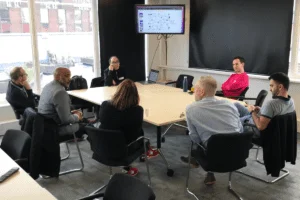Introduction
Led by: Hounslow, and Brent in partnership with Social Finance.
Idea in a nutshell: To develop a prototype multi-agency data platform that equips frontline workers with better information about the residents in their care. The project aims to develop and test a prototype digital solution that builds on a similar tool, called “Family Context” used in Children’s services.
Desired outcomes:
For people receiving care: More holistic support that looks at long-term solutions by taking into account their whole context (family, relationships, and other needs), not just borough-involved social care interactions.
For borough social workers: Better information about the wider needs of the individual, and which other organisations have already been involved with the person receiving care. This will, in turn, empower them to make better decisions on the ground.
How we envisage this will work in practice
The project aims to develop a prototype multi-agency data platform for use within the First Contact Team in Adult Social Care, building on the Family Context tool which seeks to help children’s social care practitioners better support families. The platform will be designed around the needs of adult social care practitioners and will seek to identify the most useful data sets so that people needing care can be supported in a timely and appropriate way.
With data being a key enabler, the project will also consider information governance, proportionality and the ethics of information sharing between different agencies. This project is a great opportunity to test new ways of working for frontline practitioners by using multi-agency data in a different way.
How does it support LOTI’s ambitions for radical new service models?
In this project, data and technology play a critical role and pave the way for frontline workers to work in more collaborative ways that lead to better outcomes for those who need care. More specifically, here’s why we think this project aligns well with our own ambitions:
- Power (to front-line practitioners): Social workers will be empowered to make more informed and effective decisions about someone’s care by understanding the circumstances of the individual, including potential risk factors. This reduces potential (costly) escalations down the line and is better for the overall well-being of the individual.
- Changing who is involved: We know more formal service integration across the care system is something the public sector strives to establish. In this project, having early sights of who is involved gives a chance for new more informal types of collaborative interventions to be put in place that wouldn’t otherwise happen.
- Focus on prevention and more effective reaction: As the saying goes…prevention is better than cure. This could not hold more truth than in this case. Generating useful insights by bringing together data sets from different sources or touchpoints within the care ecosystem we hope will lead to more preventative measures and holistic support for the person needing care.











